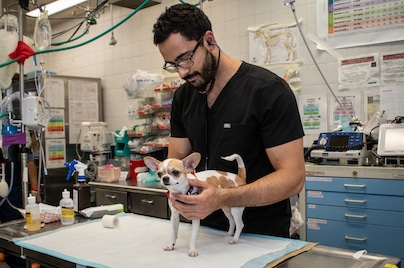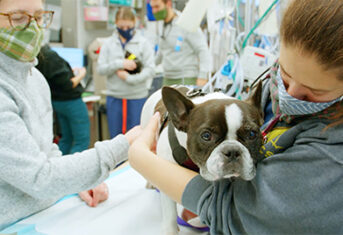What Happens When Your Dog’s Calcium is Too High or Too Low

What Happens When Your Dog’s Calcium is Too High or Too Low
Calcium is an important mineral in the bodies of humans and animals alike. It is a critical component of bones and teeth. Without calcium, your bones couldn’t support your weight and your dog’s teeth couldn’t chomp on his favorite chew toy. Veterinarians at the Schwarzman Animal Medical Center care for patients who are suffering from low calcium and high calcium. Today, I am going to write about one dog with each condition.
Calcium is Important for Function
In addition to providing structural integrity to bones and teeth, calcium supports other critical body functions. For example, calcium helps nerves send messages and muscles act on those messages. Calcium also binds with a variety of chemicals in the body to make them work. One important example of this is blood clotting – the proteins responsible for blood clotting require calcium to work. When the body needs calcium, the intestines absorb calcium from the diet in conjunction with vitamin D. If the body requires additional calcium, then the bones slowly release calcium into circulation.
When Your Dog’s Calcium is Too Low
A nice Westie patient came to see me with a low calcium level. First, he saw our orthopedic surgery team for evaluation of a limp. The limp happened some days in one leg and other days in a different leg. Turns out, his homemade diet was deficient in both calcium and vitamin D. The limp resolved as soon as we got the calcium deficiency corrected, and our theory is the limp occurred because the muscles and nerves to the legs did not work well without calcium. Scientific research has shown homemade diets – ones not formulated by a board-certified veterinary nutritionist – run the risk of being deficient in calcium.
When Your Dog’s Calcium is Too High
One type of rat poison raises calcium to fatal levels. The active ingredient is a vitamin D analogue, such as erogocalciferol or cholecalciferol, which increases calcium absorption. Unfortunately, the same reaction occurs in dogs as well as rats. AMC’s Emergency and Critical Care Service recently cared for dog that had eaten D-Con, a cholecalciferol-containing rat poison. Because the owners were so speedy in arriving at AMC, the veterinarians on duty were able to make the dog vomit up seven packages of rat poison. Then they gave activated charcoal and prescribed an oral medication to bind up any rat poison still in circulation. Two follow up appointments in the AMC ER showed no sign of elevated calcium. While the outcome was good, I am sure this was a scary ordeal for the dog’s family.
Preventing a Canine Calcium Crisis
- If you want to feed a homemade diet to your pet, make sure it is formulated by a board-certified veterinary nutritionist.
- Keep the following pet poison phone numbers at the ready:
- Pet Poison Helpline | (855) 764-7661
- Animal Poison Control | (888) 426-4435
- If your pet ingests something toxic, head to the animal ER immediately.































